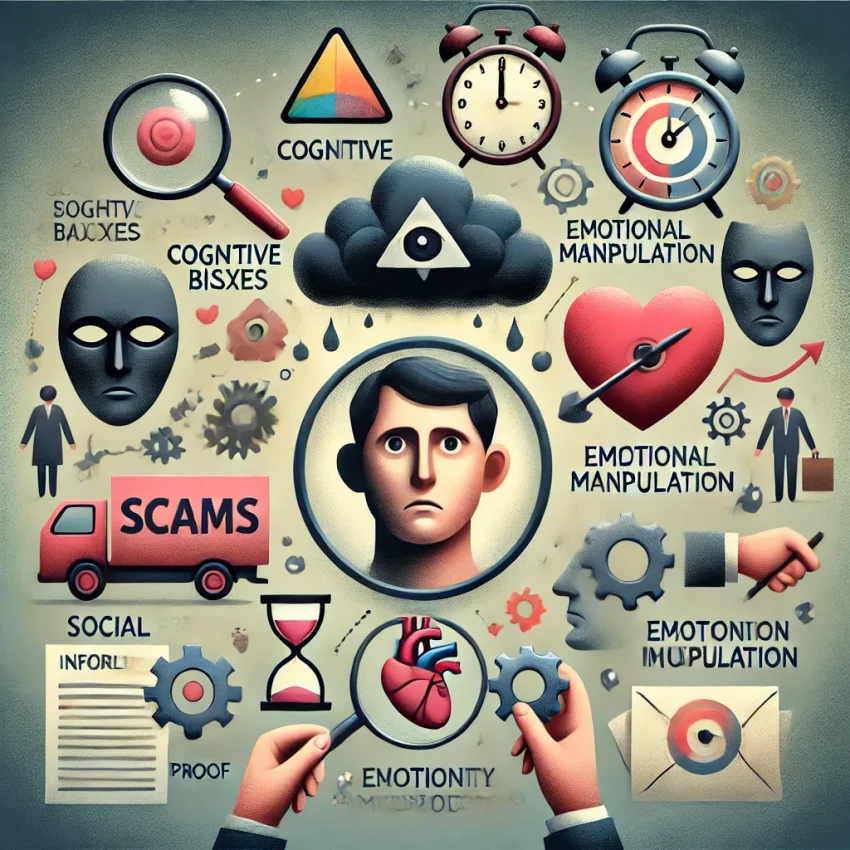In a world increasingly driven by information, it is paradoxical that so many people continue to fall prey to scams and quackery. Despite the wealth of knowledge at our fingertips, fraudulent schemes, and pseudoscientific claims seem to thrive. This troubling phenomenon can be attributed to a confluence of psychological, social, and informational factors that create a fertile ground for deception.
1. The Influence of Cognitive Biases
At the core of human decision-making are cognitive biases—mental shortcuts our brains use to process information quickly. These biases, while often helpful in daily life, can make us vulnerable to deception. Confirmation bias, for example, leads individuals to favor information that aligns with their pre-existing beliefs. When confronted with a claim that fits their worldview, people are more likely to accept it without scrutiny, even if it is false. Scammers and quacks are adept at crafting messages that resonate with these biases, making their deceptions more believable.
2. The Gap in Knowledge and Critical Thinking
A significant factor in the susceptibility to scams is the general lack of knowledge or critical thinking skills among the public. In many cases, individuals may not have the expertise required to evaluate the validity of the claims being made. Scammers often exploit this by using technical or spiritual jargon or presenting themselves as experts in fields that the average person may not fully understand. The complexity and confidence with which these fraudsters present their falsehoods can easily overwhelm and convince those who are not well-versed in the subject matter.
3. Emotional Manipulation: Playing on Fears and Hopes
Emotions are powerful motivators, and scammers are masters at manipulating them. Whether through fear, hope, or greed, these individuals craft their messages to trigger emotional responses that bypass rational thinking. For example, a health scam might promise a miraculous cure for a chronic illness, playing on the desperation of those suffering. Similarly, financial scams often prey on the fear of missing out on an opportunity for easy wealth, pushing people to make hasty decisions without proper consideration. And religions just do both.
4. The Power of Social Proof
Social proof is another potent tool in the scammer’s arsenal. Humans are social creatures, and we often look to others to guide our own behavior. Scammers leverage this by using both real and fake testimonials, reviews, or even using bots to simulate a groundswell of support for their fraudulent products or schemes. The belief held by many people does not serve as valid evidence that something is true. When people see that others appear to believe or endorse something, they are more likely to follow suit, assuming that the collective opinion cannot be wrong. This phenomenon can create a false sense of legitimacy around even the most baseless claims.
5. Authority and the Illusion of Expertise
Authority figures and experts command a significant amount of trust in society. Scammers frequently exploit this tactic by posing as credible authorities or experts in a field, or even by bribing and corrupting legitimate experts in the sector. The illusion of expertise can be highly persuasive, leading individuals to accept information without the usual skepticism they might apply. This is especially effective in areas where the public feels less knowledgeable, such as science, health, finance, or technology. When a scammer dons the guise of an expert, people are more likely to take their word at face value, often to their detriment. In some cases there are also real experts who decide to scam people, for profit usually.
6. The Role of Desperation
Desperation is a powerful driver that can push individuals to suspend their disbelief and grasp at any straw of hope offered to them. Those facing severe financial difficulties or life-threatening health conditions are particularly vulnerable to scams that promise quick fixes or miraculous outcomes. In these situations, the desire for a solution can override the usual caution that might otherwise protect them from falling victim to fraud.
7. Information Overload and the Challenge of Verification
In today’s digital age, we are inundated with information from countless sources. This overwhelming volume of data makes it increasingly difficult for individuals to discern credible information from falsehoods. Scammers take advantage of this information overload by inserting deceptive content into the mix, knowing that many people will not have the time or resources to verify each piece of information they encounter. The sheer volume of information can desensitize individuals to the need for careful evaluation, making them more susceptible to scams.
8. Sophisticated Scam Tactics
Finally, the tactics employed by modern scammers are increasingly sophisticated. These individuals use psychological strategies such as urgency, secrecy, and flattery to pressure their targets into making decisions quickly and without proper reflection. For example, a scam might create a false sense of urgency by claiming that a limited-time offer is about to expire, prompting the victim to act immediately. By creating an artificial time constraint, scammers can short-circuit the critical thinking process, leading to hasty, uninformed decisions.
In conclusion, the reasons why people continue to fall for scams and quackery are complex and multifaceted. By understanding the psychological, social, and informational dynamics at play, we can better equip ourselves and others to recognize and resist these deceptions. Education and awareness are key in fostering a society that is more resilient against the ever-evolving tactics of scammers and quacks. As we continue to navigate an increasingly complex information landscape, critical thinking and skepticism will be our best defenses against the pervasive threat of fraud.
That’s why most people believe in new age, spirituality, religion, fake medicine, alternative medicine, integrated medicine, traditional chinese medicine, ayurveda, ostheopathy, chiropractice, homeopathy and other lies: even if they are all officially false, still most people don’t want to accept it.
Andrea Bodei
EUCIF
The European Cyber Intelligence Foundation is a European non-profit think tank specializing in intelligence and cybersecurity, offering consultancy services to government entities

